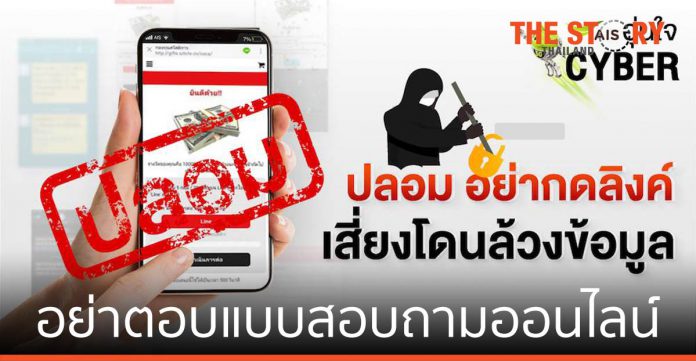High risks in responding to online surveys or forwarding them, including loss of personal data
Thailand’s digital services leader, Advanced Info Service (AIS), has issued an uncommon warning about what it calls the ‘ever-greater scale’ of online scamming.
The company’s Head of Public Relations, Saichon Submakudom, says the Covid-19 situation has meant more people working from home, learning from home, and even trading online, and this has led to Thai people communicating more and more on online platforms.
- Visa becomes first major payments network to settle transactions in USD Coin (USDC)
- NSTDA’s A-MED Research Center creates tech innovations for children with learning disabilities
“This makes them prey for scammers stealing personal data, and deceiving users on an ever-greater scale,” Saichon warns. “Attacks include phishing, which is the use of fake websites to obtain personal data. They take advantage of the current social situation, such as registering for vaccination. They trick users into revealing One-Time Passwords (OTPs), and then use them for financial transactions. Pop-up ads pretend to scan for viruses while encouraging clicks, and fake news deceives people into sharing it further.
“We have now discovered another scam inviting users to complete an online survey and share it to their network in exchange for prizes,” Saichon explains. “When customers visit the URL in the link – and it looks like an online survey – the customer’s telephone number is used to automatically send an iSMS overseas message, generating unseen charges that are higher than usual. There is also a risk that the personal data obtained will be used incorrectly.
“After AIS investigates these irregularities, the company blocks suspicious URLs or links to protect our customers, who are then unable to click on that URL or link. However, this doesn’t stop the scammers, who will go on to create similar URLs or links in the future.
“Our concern for our customers has led us to issue this warning for them to be careful and not to click on unfamiliar URLs or links,” Saichon continues. “This includes text that seems dubious, inviting people to join an activity, or where the user is asked supply data for a prize. Please check to be confident that a URL or link is genuine before sharing it with people you know. This is to prevent the risk of allowing scammers to access your personal data, or create unusual charges that are potentially damaging.”





